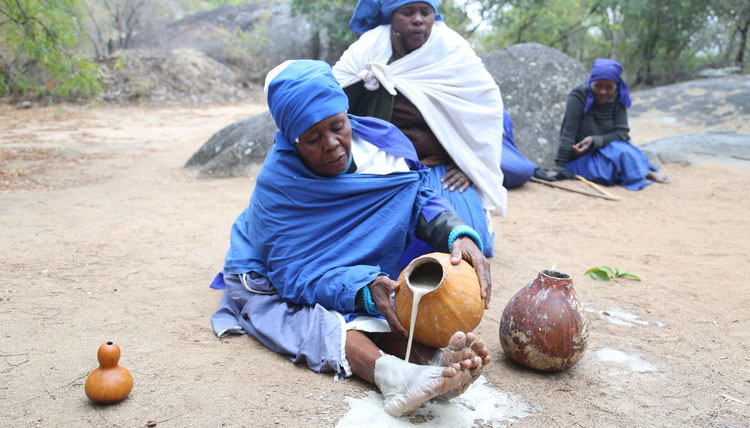
The Sunday Mail

“It was on June 29, just a month before the nation votes on July 30, that they came and desecrated our shrine. Whether that is pure coincidence, a planned act or just another act of vandalism, we are not sure,” explained 88-year-old Solifa Ncube Zikhali, the shrine keeper at Njelele.
The explanation came after a rare visit by The Sunday Mail crew inside Njelele Shrine, the shrine that has been trodden upon for centuries for spiritual guidance.
Rare in the sense that this was the first time that cameras were being allowed inside Njelele — a shrine so sacred that shoes, watches, in fact anything metallic or red in colour, has to be left some 200-or-so metres from the entrance.
“This is the first time that we have allowed cameras inside Njelele, otherwise we have never allowed anyone to take photographs of our sacred shrine. We hold it in such high regard,” added Zikhali.
“Breaking” that unwritten rule, by allowing our news crew unfettered access inside Njelele is part of a plea, a nationwide plea, to help apprehend the perpetrators of the callous desecration of the shrine on the night of June 29.
“The act happened on the night of the Friday,” Owen Moyo, one of the aides to the shrine-keeper picks up the narration, “and we only discovered it on Saturday morning when we came for the daily pilgrimage.”
Njelele Shrine, so holy that history records that a voice could be heard from it as late as this past century, has been a pilgrimage site for time immemorial as people from walks of life and spiritual persuasions — and from across the continent — visited it for guidance, cleansing and fulfilment.
So convinced of the powers of Njelele Shrine is Zikhali that he asserts it is from these mountains that God spoke to Moses as captured in the biblical scriptures.
Though Njelele is known mainly as a rain-making shrine, over the course of time, centuries rather, it has been used by many to ask for spiritual guidance.
“Every August we hold our rain-making ceremonies at the shrine, whereby traditional spiritual leaders from across the country come here and ask the gods for rain.
“However, at any given time, those who want to appease their spirits or ask their ancestors to bless their fortunes come here for thanksgiving or to make any sacrifices,” explained Zikhali.
Except for Sundays and Wednesdays, every other day of the week, people from different walks of life, locals and foreigners, black and white, visit the shrine for prayers.
But they don’t visit the shrine alone, they are accompanied by the shrine keeper, who is familiar with the manner with which to communicate with the spirits.
Part of the sacrifices, depending on what is being sought, includes the slaughter of a goat and some traditional brew. The rituals for the slaughtered animal are conducted at the shrine keeper’s homestead, whilst the beer is taken to the shrine, where some of it is drunk and the other poured on the mystical rock.
It is this rock that was tampered with. After some digging, the culprits tried to blow the rock away. Up the shrine, inside the cave, they destroyed some claypots, before taking away about a gramme of gold.
“The gold was part of the offerings that were given by individuals and companies to the spirits over a period of time. The claypots have been here for a period that we don’t even know. They only left four hoes,” explained Zikhali.
Though Matobo police attended to the scene, no culprits had been arrested by the time of going to print, which left Zikhali looking up to the spirits to take up their own revenge.
“No-one tampers with this shrine and gets away with it. The spirits have their own way of dealing with such malcontents and soon someone will confess to having taken part in destroying our shrine. Worse, these culprits will meet a very painful death,” added Zikhali.
But what is worrying Zikhali and the community around the shrine is that this is not the first time that Njelele has been defiled. “In 1980, on the eve of the general elections then, Njelele faced the same fate, it was bombed also. We are not sure if there are people out there who think that this shrine is linked to the running of the country.
“If there are any such powers to the shrine, we don’t know. What we know is that we have used it for years to ask for the rains, to thanks our ancestors as well as ask the same for spiritual guidance.”
Lying some 80 kilometres to the south of Bulawayo and southwards of the World View at Matopos Hills, Njelele Shrine lies in the Silozwi communal lands.
During the liberation struggle, the shrine played a significant role in helping the leaders wage the war against the settlers. Even the late Dr Joshua Nkomo mentions the shrine in his autobiography, The Story of My Life, writing: “I cannot explain this event, but it happened and the prophecy came true. The other people accompanying us witnessed it.”
He was referring to one of the pilgrimages that he had undertaken to Njelele in the early 70s, whereupon a voice had thundered that Zimbabwe would be freed within 30 years.
It should be this mystic association with Njelele that must have made it a subject of its defiling, probably in the hope that its “anointing” powers be destroyed.




